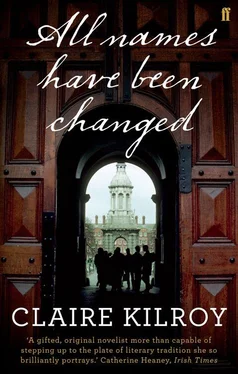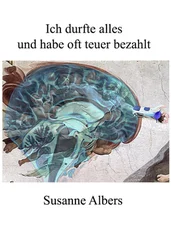Claire Kilroy - All Names Have Been Changed
Здесь есть возможность читать онлайн «Claire Kilroy - All Names Have Been Changed» весь текст электронной книги совершенно бесплатно (целиком полную версию без сокращений). В некоторых случаях можно слушать аудио, скачать через торрент в формате fb2 и присутствует краткое содержание. Год выпуска: 2010, Издательство: Faber & Faber, Жанр: Современная проза, на английском языке. Описание произведения, (предисловие) а так же отзывы посетителей доступны на портале библиотеки ЛибКат.
- Название:All Names Have Been Changed
- Автор:
- Издательство:Faber & Faber
- Жанр:
- Год:2010
- ISBN:нет данных
- Рейтинг книги:5 / 5. Голосов: 1
-
Избранное:Добавить в избранное
- Отзывы:
-
Ваша оценка:
- 100
- 1
- 2
- 3
- 4
- 5
All Names Have Been Changed: краткое содержание, описание и аннотация
Предлагаем к чтению аннотацию, описание, краткое содержание или предисловие (зависит от того, что написал сам автор книги «All Names Have Been Changed»). Если вы не нашли необходимую информацию о книге — напишите в комментариях, мы постараемся отыскать её.
All Names Have Been Changed — читать онлайн бесплатно полную книгу (весь текст) целиком
Ниже представлен текст книги, разбитый по страницам. Система сохранения места последней прочитанной страницы, позволяет с удобством читать онлайн бесплатно книгу «All Names Have Been Changed», без необходимости каждый раз заново искать на чём Вы остановились. Поставьте закладку, и сможете в любой момент перейти на страницу, на которой закончили чтение.
Интервал:
Закладка:
New Square was deserted, not a soul in sight. The cobbles glistened in the lamplight and drizzle. I was nothing but a black shadow crossing the stones. I veered off the path and pressed my forehead against the façade of the Colonnades. It was as clammy as the wall of a cave. I would describe my state at that moment as borderline murderous. I had left it too late, you see; I saw. The years spent cherishing the aspiration to be a writer had wrapped it up and sealed it off, rendering it as discrete and inaccessible to the substance of my being as a pearl was to an oyster.
It was Glynn I blamed. He had lured me there, after all. He had enticed me to that bleak place only to abandon me to it. Had he materialised at that point, had he just happened to stray past, God forgive me, I’d have taken a run at him. The man wouldn’t even have known who I was.
*
We met in House Eight for the fourth week. Guinevere drummed her fingers, Aisling inscribed the desk with the ornamental dagger hanging from her neck.
‘How long can this go on?’ Antonia wondered out loud.
Faye did her best to put a brave face on things so that the rest of us wouldn’t lose heart. ‘I’m sure Professor Glynn has a very good reason,’ she offered. Antonia wanted to hear it.
The chairs we had assumed that first day had become set fixtures. The group sat up front in a row of four like the school debating team. I was stationed a few rows behind, by no means a jolly presence. One of the other girls was wedged against the radiator, but the second girl, the one who used to sit by the door, hadn’t shown up that week. We never saw her again. The guy with the ponytail was still dug into his corner, the army-surplus jacket on his desk demarking his territory.
Antonia was complaining about Glynn; the usual drill. I wasn’t paying attention to the specifics. I was thinking that I hadn’t known loneliness like it before, despite my years in England. It was the loneliness of being in the company of the group, but not part of it. I gazed at them, at their baffling closed circuit of four. Aisling’s hair was as black and blank as a hole in the universe, a rip in the fabric of reality.
Guinevere must have sensed me staring. I hadn’t made a sound, but she turned around and met my eye and smiled. This was a smile of considerable sweetness. I smiled back and was still smiling long after she’d looked away. The group then packed up and left the workshop in that abrupt, symbiotic manner of theirs. The atmosphere in the workshop sagged. I was almost used to it.
And then, out of nowhere, seconds after their departure, the guy with the ponytail got to his feet. His name was Mike and he spoke without removing his eyes from the window. ‘Lads,’ said Mike, ‘he’s coming.’
6 Melmoth the Wanderer
We each had a favourite photograph of Glynn. Mine was the aforementioned Irish Times shot taken in his study, or ‘The great writer at work,’ as I had mentally subtitled it. Faye nominated the one taken in the early 1970s by the Observer , which was subsequently reprinted in the British broadsheets every time Glynn won a prize, and he was on a roll that decade, go on you good thing. What a rush of fondness that particular portrait generated. He could be a real charmer when it suited him, P. J. Glynn. The photographer must have been a woman. We were as familiar with his face in that shot as we were with the faces of our grandparents. You would swear that the man was not a complete stranger to us all. The jaunty go-heck of him caught by the lens appealed to Faye enormously. This was how she liked to think of him — relaxed, good-humoured, congenial, on the brink of astonishing literary achievement but making no great fuss of it.
He was pictured on what the caption printed beneath described simply as ‘a Dublin street’, leaning at an angle of around sixty degrees against the wooden jamb of what we decided was the door to Bartley Dunne’s. By ‘we’, I mean, of course, ‘they’: the women. The women declared it the door to Bartley’s, and so it became the door to Bartley’s — the fiction-making process in action. I just went along with their reasoning. How they were so positive it was the door to Bartley’s, I have no idea. No definitive means of identification were in shot. Just another of those arbitrary decisions the group arrived at which went on to enter the realm of fact. For all I know, they were right.
The composition of the image was immensely attractive. Faye kept a folded copy in an envelope as a bookmark, delicate as a pressed flower. The interior of the pub, what could be seen of it, formed a narrow column of black ink running the full length of the left-hand side of the frame. In the space between Glynn’s tilted body, the door and the pavement stood a brilliant triangle of morning light, solid and true as an object in its own right. Glynn somehow always contrived to lure the eye toward the unseen. The triangle is just one example.
He had more hair then, and less flesh, and was dressed in old jeans and a plain white shirt. The shirt was open at the collar and rolled up at the sleeves, for all the world a man who’d logged a hard day’s graft. Against the white cotton, his skin looked darker than we knew it to be, and his eyes looked black, not blue. ‘Byronic’ was the word Faye employed. His gaze was candid in the image, amenable even, lacking the customary scowl that appeared when photographers did. In fact, in that picture he almost looked pleased. I would go so far as to say happy.
What is not immediately apparent to the casual observer is that Glynn is dressed for a different season. You have to look at the photograph for a long time, and still there is no guarantee that you will notice this for yourself. I for one did not. Faye had to point it out. It was the telltale plume of white breath escaping from his mouth that had alerted her keen eye. ‘See how cold it is?’ she asked me, tapping the ghostly vapour with her fingernail. I dismissed it as an exhalation from his cigarette. Faye seemed prepared for this response — to have anticipated it, in fact, as if already she had learned to expect no better from me. ‘What cigarette?’ she countered, searching not the photograph, but my face. ‘Show me where you see the cigarette, Declan.’ It was unlike her to be so assertive.
I examined the petal-frail newspaper cutting again. Faye was right. There was no cigarette in Glynn’s hand, though I could have sworn I’d seen one a second before. The other three had remained attentive throughout this exchange. If they’d been darting knowing looks around the table at my expense, these too had escaped my notice.
‘Look at the background figures,’ Faye continued in the manner of a tour guide discoursing upon a great painting, now broadening her frame of reference to encompass the pedestrians on the street. She had given her subject much consideration. ‘Look at the way they’re huddled up, Declan. They’re absolutely perished.’
I could not confute her. The passers-by did indeed look frozen, buttoned into winter coats and wrapped up in scarves, some of them moving at such a clip that all the camera had captured was a blur of limbs. Glynn’s nonchalant deportment betrayed no vulnerability to the cold against which the ordinary mortals around him struggled. How easeful he looked, the still centre of the image, as if it were perpetually summer in his domain. Antonia, of course, could well have had the measure of him when she pronounced him too effing plastered to register the elements.
This immunity to his surroundings seemed proof of something. It distinguished Glynn as fundamentally, intrinsically different to the rest of us. So entirely preoccupied was that great forehead with matters cerebral there simply wasn’t room left in it to bother with minor details such as the weather. Transported is the word. This appealed to our notions of what a writer was. It was the condition to which we aspired. Glynn was everything in that photograph that an artist at the height of his powers should be, from the ink stains on his fingertips to the dishevelment of his hair. That was the Glynn we had signed up to see, and that was the Glynn we got.
Читать дальшеИнтервал:
Закладка:
Похожие книги на «All Names Have Been Changed»
Представляем Вашему вниманию похожие книги на «All Names Have Been Changed» списком для выбора. Мы отобрали схожую по названию и смыслу литературу в надежде предоставить читателям больше вариантов отыскать новые, интересные, ещё непрочитанные произведения.
Обсуждение, отзывы о книге «All Names Have Been Changed» и просто собственные мнения читателей. Оставьте ваши комментарии, напишите, что Вы думаете о произведении, его смысле или главных героях. Укажите что конкретно понравилось, а что нет, и почему Вы так считаете.












